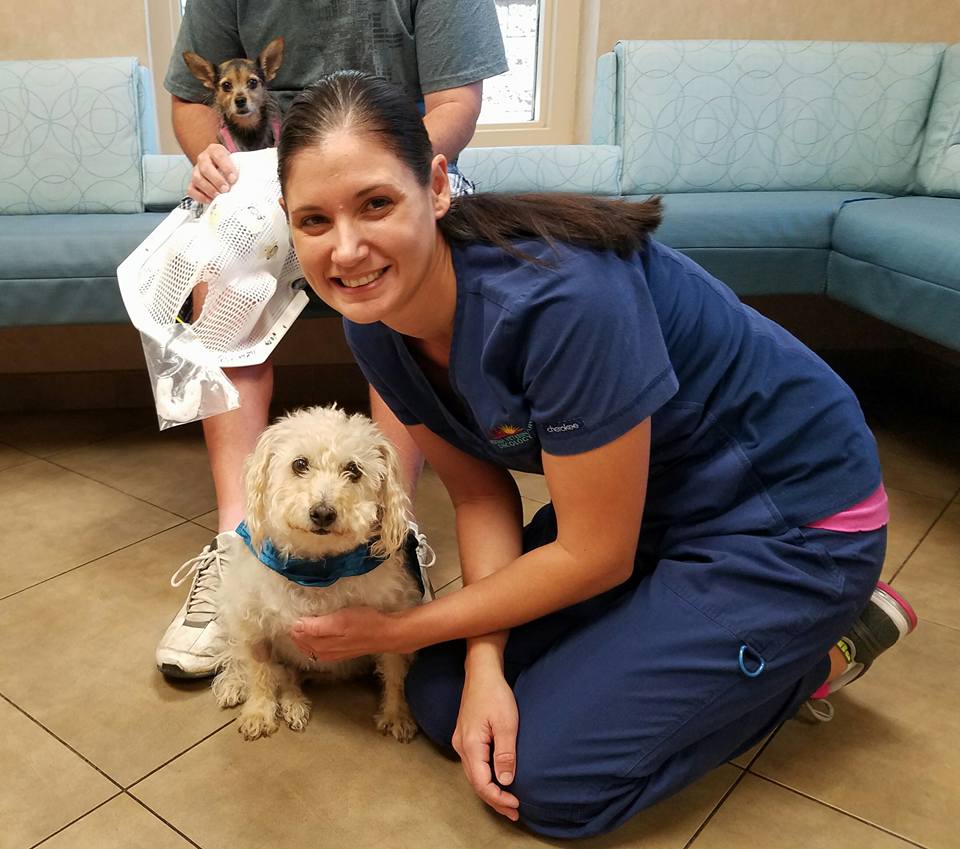Oral Cancers In Dogs
Oral tumors in dogs are relatively common. According to the American College of Veterinary Surgeons (ACVS), “benign and malignant tumors of the oral cavity account for … 6% of all tumors in dogs.”1
How To Make An Appointment
Reach out to us at (833) 467-2836, or streamline your request by selecting one of the options below:
Does My Dog Have an Oral Tumor?
Unfortunately, when it comes to tumors in the mouth, most are malignant. The oral cavity includes more than just your dog’s teeth and gums. It also includes lips, the hard and soft palate (roof of the mouth), upper and lower jaw, cheeks, tongue, and the floor of the mouth. Oral melanoma, squamous cell carcinoma, and fibrosarcoma are common oral tumors in dogs. Other types include adenocarcinomas, ameloblastomas, and osteosarcomas. Oral tumors—both cancerous and non-cancerous—can form in any part of your pet’s mouth.
Signs and Symptoms of Oral Cancer in Dogs
There are no definitive causes of oral cancers; therefore, early detection is vital. Brushing your dog’s teeth every day not only helps keep your pet’s teeth and gums healthy—it will also familiarize you with your canine’s mouth. By brushing their teeth regularly, you are more likely to notice the signs of oral cancer, such as if something looks or smells different. Annual dental exams by a veterinarian are also important. During professional dental cleaning by a veterinarian, your pet will be anesthetized. This allows your veterinarian to take full mouth dental radiographs (x-rays) and thoroughly examine and clean your pet’s teeth above and below the gum line. Any tumors or growths forming in the mouth will be seen by the veterinarian. Any and all growths should be checked by a veterinarian for testing. Cancerous tumors can metastasize, or spread, into other parts of the body if left untreated. Typically, oral cancers are found in geriatric canines. Occurrences of the sickness in males and females are generally equal and there is no breed predilection.
Watch for the following clinical signs of oral cancer:
- Bad breath (halitosis)
- Difficulty eating
- Drooling
- Head-shy
- Lethargy (may also indicate something other than oral tumors)
- Not wanting to eat on one side
- Ropey saliva with or without blood
- Weight loss (may also indicate something other than oral tumors)
Diagnosis and Staging for Oral Tumors in Dogs
Along with bloodwork, your veterinarian may do a fine-needle aspiration or a biopsy of the tumor and, in some cases, the lymph nodes to confirm whether it is cancerous. If the sample taken is confirmed as cancer, the next step is to determine the stage of cancer. Your pet may need radiographs or a CT scan of the head or chest area. This is done in order to see if cancer has spread to other parts of the body. During this time, your primary care veterinarian may refer your dog to a board-certified veterinary oncologist for the tests and to consult on treatment options. Veterinary oncologists are trained to diagnose and treat cancers in pets.
Treatment Options for Dogs with Mouth Tumors
A cancer diagnosis can feel devastating, but the good news is that your canine has options. There are typically two methods for treating oral cancers and tumors in pets.
Oral Surgery
In many cases, surgery can be performed to remove the tumor if possible. Surgery requires that margins around the tumor be taken out along with the tumor. The extent of surgery depends on the type of cancer and location of the tumor, and often requires removing part or all of the jaw, teeth, and/or surrounding bone.
Advanced Radiation Therapy
If surgery is not an option or the entire tumor cannot be removed, the dog may be a good candidate for advanced radiation therapy, or stereotactic radiosurgery (SRS). Due to its ability to deliver high doses of radiation with sub-millimeter precision, SRS is an ideal option when a complete resection of the tumor through surgery is not possible. For example, Pet Hero Snickers was a 12-year-old Shih Tsu that was diagnosed with advanced oral squamous cell carcinoma. Neither surgery nor conventional radiation therapy was an option for him due to the location of his tumor. Snickers received SRS treatment, which cured his cancer, giving him three more years with his family.
Combination Surgery and Radiation Treatment
In some cases, a combination of treatment options is used. The animal may need to undergo surgery for removal of the oral tumor followed by radiation therapy or chemotherapy. In cases of oral melanoma, immunotherapy or vaccines may also be used to treat the cancer. Oral tumors come in many types and location, so the prognosis is dependent on the individual pet’s specific situation. There are new advancements like SRS and immunotherapy developing rapidly in veterinary medicine, so we recommend that you explore all treatment options with a board-certified veterinary oncologist.
It’s essential to provide your dog with love, comfort, and support during this difficult time. If your canine is having trouble eating, try feeding your pet soft foods. Make sure to give your dog plenty of fresh water and correctly administer any pain medicine that’s prescribed by your vet.
The Prognosis for Dogs With Oral Cancer
The prognosis for canines with this illness depends on a few factors, including the tumor type, whether the cancer has spread to other areas of the body, and the chosen treatment option.
Questions? We are here to help.
If your pet has been diagnosed with cancer, contact our Pet Advocates at 833-738-4376. Our team members are ready to help answer your questions. You can also view veterinary cancer care centers across the country that are supported by PetCure Oncology.
REFERENCES
1, 2 “Oral Tumors,” ACVS.org, https://www.acvs.org/small-animal/oral-tumors
If your dog is displaying any symptoms of cancer or has been diagnosed with cancer, sort below by cancer type or tumor location to learn more about the most common types of cancer in dogs and available treatment options. Click on the links for more specific information on treatment and real patient stories.
HEAD & NECK TUMORS IN DOGS
PELVIC CANAL TUMORS IN DOGS
- Anal Gland Adenocarcinomas in Dogs
- Transmissible Venereal Tumors (TVT) in Dogs
- Prostatic Tumors in Dogs
OTHER TUMORS IN DOGS
CARCINOMA/EPITHELIAL CANCER IN DOGS
- Adrenal Tumors in Dogs
- Anal Gland Tumors in Dogs
- Basal Cell Tumors in Dogs
- Biliary Cancer in Dogs
- Bladder, Prostate & Urethra (Transitional Cell) Cancer in Dogs
- Chemodectomas in Dogs
- Ear (Ceruminous Gland) Cancer in Dogs
- Liver (Hepatocellular) Cancer in Dogs
- Lung (Bronchogenic/Non-Small Cell) Cancer in Dogs
- Nasal (Sinonasal/Paranasal) Cancer in Dogs
- Neuroendocrine Carcinoma in Dogs
- Pancreatic Cancer in Dogs
- Perianal Cancer in Dogs
- Prostate (Prostatic) Cancer in Dogs
- Kidney (Renal) Cancer in Dogs
- Salivary Gland Tumors in Dogs
- Squamous Cell Carcinomas in Dogs
- Thymoma Cancer in Dogs
- Thyroid Cancer in Dogs
- Tonsillar Cancer in Dogs
ROUND CELL CANCER IN DOGS
SARCOMA/MESENCHYMAL CANCER IN DOGS
- Astrocytoma Cancer in Dogs
- Bone (Osteosarcoma) Cancer in Dogs
- Brain (Glioma) Cancer in Dogs
- Brain (Meningioma) Cancer in Dogs
- Chondrosarcoma Cancer in Dogs
- Choroid Plexus Papilloma in Dogs
- Ependymoma Cancer in Dogs
- Fibrosarcoma in Dogs
- Hemangiopericytoma in Dogs
- Histiocytic Sarcoma in Dogs
- Peripheral Nerve Sheath (Schwannoma) Tumors in Dogs
- Multilobular Osteochondroma in Dogs
- Oligodendroglioma in Dogs


